immune & allergy support
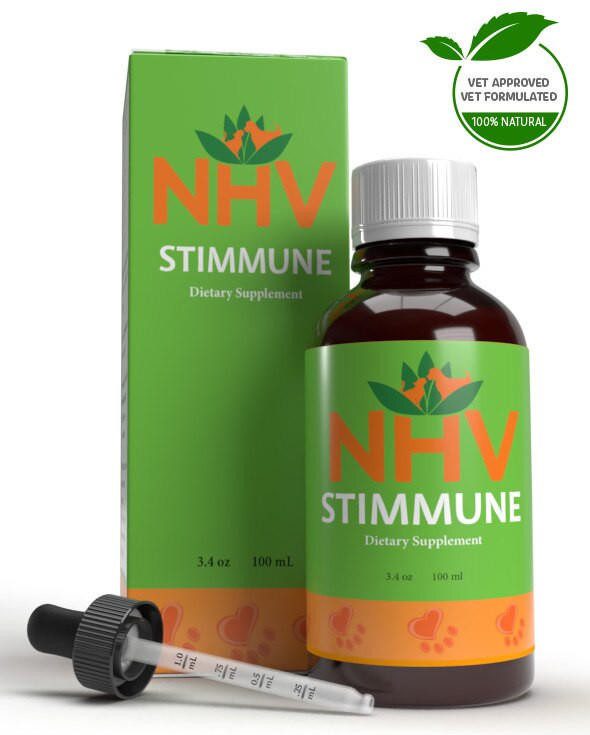
free shipping over $100 (USA & Canada)
1-877-937-4372 the pet expert hotline
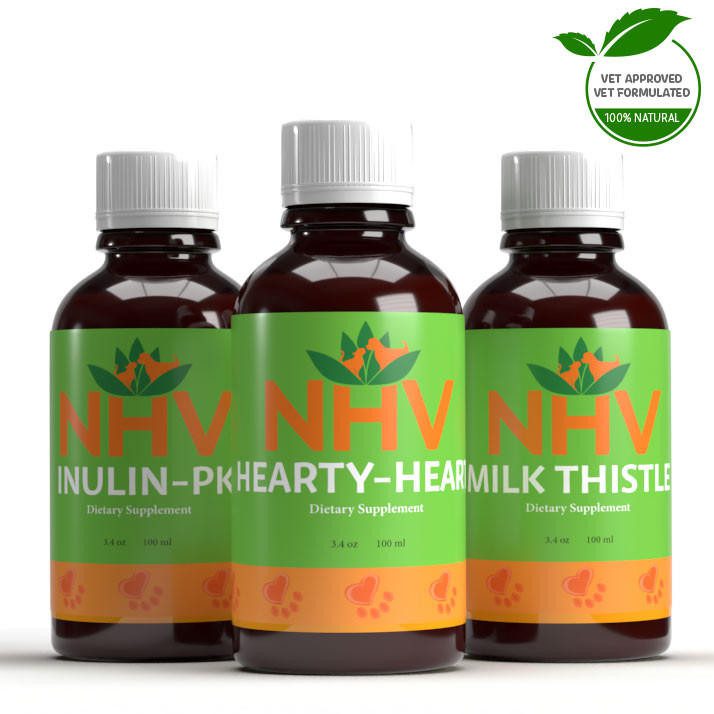

April is heartworm awareness month, which means it’s that time of year when your veterinarian may want to check your dog or cat for heartworm disease.
Heartworms are transmitted through the bite of a mosquito, which carries immature larvae from the parasite.
Heartworm in pets is a serious and potentially fatal disease that is caused by foot-long worms (heartworms) that live in the heart, lungs, and associated blood vessels of affected dogs and cats. The heartworm can cause severe lung disease, heart failure, and damage to other organs in the body. It affects dogs, cats, and other mammals such as wolves, coyotes, foxes, sea lions, and in rare instances humans. Thankfully, in my practice, I only see a few cases of heartworm in dogs a year. Although, even in those few instances, the conversation with the animal’s guardian is always difficult as the treatment is hard on my patients, and can be costly.
Like most pathogenic infections, the earlier a diagnosis can be made the better chance for recovery. Be sure to have your dog or cat checked this spring for heartworm disease.
Heartworms are transmitted through the bite of a mosquito, which carries immature larvae from the parasite Dirofilaria immitis. These larvae enter into the pet’s skin through the mosquito bite. From the site of the mosquito bite, the larvae molt and travel through the pet’s body, until they enter the pet’s heart and pulmonary vessels in the lungs. Once in the pulmonary vessels they grow, pushing up until some reach the pulmonary artery.
The now mature heartworm reproduces, creating microfilaria, which circulates in the bloodstream of the pet. When a mosquito bites the infected pet and takes a blood meal, it picks up the microfilaria. When this mosquito then bites another pet, it transmits the infection.
Once mature, the heartworm can live up to 5-7 years in dogs, and 2-3 years in cats. Since the heartworm can live so long, this can lead to an increasing number of worms in an animal as a pet becomes infected over and over each mosquito season.
Heartworm infection in both cats and dogs is diagnosed by a blood test. If the test is positive, other tests will be ordered to diagnose the stage of heartworm disease. Heartworm testing should begin at 7 months in a puppy, and annually in adult pets if protected with prevention.
Unfortunately, there are few clinical signs in the early stages of the disease, which is why testing is so important. As the disease advances, dogs may exhibit a cough, decreased interest in exercise, fatigue after moderate activity, decreased appetite, and weight loss. As the disease further progresses, signs of heart failure ensue, including worsening respiratory signs and cough, swollen belly, and in worst cases “caval syndrome”, which is a form of cardiovascular collapse.
With cats, the signs of heartworm can be extremely subtle or very severe. Symptoms may include coughing, asthma-like attacks, vomiting, lack of appetite, and weight loss. Unfortunately, the first sign of heartworm disease in some cats is sudden collapse or even death.
Heartworm disease has been diagnosed in 50 states. Protecting your pet with good nutrition and a healthy lifestyle that includes heartworm prevention is the best thing you can do.
Natural supplements, such as NHV Hearty Heart, and natural parasite cleansers like NHV Inulin PK may help with heartworm disease.
For extra support, I would also recommend NHV Stimmune, as well as NHV Milk Thistle, and the superherb NHV Turmeric, which will help support your pet’s body.
Natural mosquito deterrents are also recommended.
For further information please feel free to leave a comment below or contact us for an online consultation.
immune & allergy support

Natural Dog Food Allergy Supplement and Immune Support.
buy 2 and save $3
3 month supply for a small to medium size
Soothes food allergies, skin allergies (dermatitis), and infection. Helps relieve a variety of symptoms related to allergies. Supports a healthy balance of the immune system in pets with conditions such as autoimmune disease.

Soothes food allergies, skin allergies (dermatitis), and infection. Helps relieve a variety of symptoms related to allergies. Supports a healthy balance of the immune system in pets with conditions such as autoimmune disease.
Stimmune helps balance the immune system and helps ease allergy symptoms that can make your dog miserable. Stimmune is an all-natural, vet-formulated dog allergy immune supplement that will help your pet deal with dog food allergies as well as other immune related disorders.
Stimmune can provide dog allergy help with allergic reactions related to food, as well as environmental allergies including reactions to fleas, insect bites, food and other environmental factors. For more acute seasonal or environmental allergies, please try Alge-Ex for a remedy specifically formulated for your dog.
An allergy is an overreaction of the immune system to a normally harmless substance called an antigen. Allergies in dogs often occur when allergens are inhaled, ingested, or absorbed by the body. When this occurs, the immune system becomes over-reactive to substances it believes are harmful. This reaction causes a release of histamine, causing the common allergy symptoms in your pet.
The cause of allergies in dogs can be difficult to determine. While it is always best to eliminate the cause altogether, like omitting a specific food from their diet, some causes can be nearly impossible to totally eradicate, like dust mites or pollen. This is where a dog allergy supplement that is taken daily can help relieve your loved one of common allergens, even when you're not exactly sure what they are allergic to.
Dog food allergy support is close at hand with Stimmune added into your pet’s daily regimen. This 100% natural herbal supplement was formulated by a holistic veterinarian to comprehensively care for your pet’s health.
Explore our Pet Expert Q&A to ask questions about your pet’s allergic reactions or view questions that other concerned pet owners like you have posted. Or, visit our blog to learn how to prevent food allergies in dogs and cats.
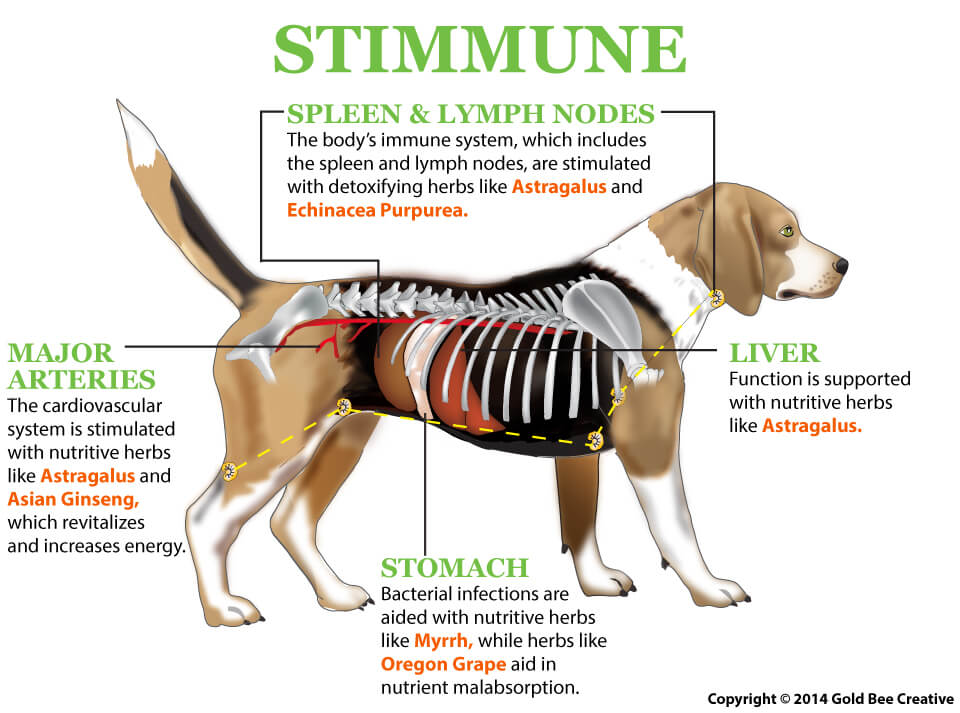
Astragalus – Stimulates liver function and helps balance the immune system. High in antioxidants it also helps protect against oxidative damage.
Echinacea Purpurea – Reduces inflammation, helps boost the immune system and efficiently fights infection.
Oregon Grape – Has antibiotic, anti-inflammatory and immunostimulatory properties.
Asian Ginseng – Has been used for thousands of years to help against various health issues. This antioxidant herb helps balance the immune system, helps the body fight infections and helps the body cope against stress.
Myrrh – An astringent that relieves irritated skin, Myrrh is high in anti-inflammatory and antioxidant effects.
Select your pet's weight to determine the correct dose.
To be taken twice daily. Determine your pet’s weight and then use the easy chart below to determine the correct dose. This is the minimum dosage.
Pet's Weight Dosage
0 - 15 lb = 0.5 ml
16 - 30 lb = 1.0 ml
31 - 45 lb = 1.5 ml
46 - 60 lb = 2.0 ml
61 - 75 lb = 2.5 ml
Over 75 lb = 3.0 ml
For small animals (rabbits, ferrets), avians and reptiles use 1 drop for every 2 lb of body weight.
How to Administer
Shake well before use. The easiest method is to use the dropper provide and places the drops into your pet’s food or favorite treat. You can also use the dropper and squirt directly into the pet’s mouth.
Some pets can be finicky, if this occurs consider hiding the drops in foods most pet’s love such as fish, chicken or yogurt or a favorite treat. If your pet only eats dry food then soak a few kibbles at feeding time.
For Best Results
Herbal dietary supplements are beneficial to the health and wellbeing of your pet and are safe for long-term use. Every pet responds to natural herbal supplements differently, therefore it is important to be consistent and administer the product daily. Supplements generally take two to four weeks to take effect, however this will vary from one animal to the next.
Product Storage
All NHV Natural Pet Products are pure herbal extracts and contain no artificial additives, preservatives or coloring. Shelf life after opening is 6 months and must be refrigerated after opening.
Cautions and Contraindications
Do not use Stimmune in pregnant or nursing animals. Speak to your vet before using our products. A second visit is recommended if your pet’s condition does not improve, or deteriorates after continued use of the supplements.
All information provided by NHV Natural Pet Products is for educational purposes only.
Stimmune helps balance the immune system and helps ease allergy symptoms that can make your dog miserable. Stimmune is an all-natural, vet-formulated dog allergy immune supplement that will help your pet deal with dog food allergies as well as other immune related disorders.
Stimmune can provide dog allergy help with allergic reactions related to food, as well as environmental allergies including reactions to fleas, insect bites, food and other environmental factors. For more acute seasonal or environmental allergies, please try Alge-Ex for a remedy specifically formulated for your dog.
An allergy is an overreaction of the immune system to a normally harmless substance called an antigen. Allergies in dogs often occur when allergens are inhaled, ingested, or absorbed by the body. When this occurs, the immune system becomes over-reactive to substances it believes are harmful. This reaction causes a release of histamine, causing the common allergy symptoms in your pet.
The cause of allergies in dogs can be difficult to determine. While it is always best to eliminate the cause altogether, like omitting a specific food from their diet, some causes can be nearly impossible to totally eradicate, like dust mites or pollen. This is where a dog allergy supplement that is taken daily can help relieve your loved one of common allergens, even when you're not exactly sure what they are allergic to.
Dog food allergy support is close at hand with Stimmune added into your pet’s daily regimen. This 100% natural herbal supplement was formulated by a holistic veterinarian to comprehensively care for your pet’s health.
Explore our Pet Expert Q&A to ask questions about your pet’s allergic reactions or view questions that other concerned pet owners like you have posted. Or, visit our blog to learn how to prevent food allergies in dogs and cats.

Astragalus – Stimulates liver function and helps balance the immune system. High in antioxidants it also helps protect against oxidative damage.
Echinacea Purpurea – Reduces inflammation, helps boost the immune system and efficiently fights infection.
Oregon Grape – Has antibiotic, anti-inflammatory and immunostimulatory properties.
Asian Ginseng – Has been used for thousands of years to help against various health issues. This antioxidant herb helps balance the immune system, helps the body fight infections and helps the body cope against stress.
Myrrh – An astringent that relieves irritated skin, Myrrh is high in anti-inflammatory and antioxidant effects.
Select your pet's weight to determine the correct dose.
To be taken twice daily. Determine your pet’s weight and then use the easy chart below to determine the correct dose. This is the minimum dosage.
Pet's Weight Dosage
0 - 15 lb = 0.5 ml
16 - 30 lb = 1.0 ml
31 - 45 lb = 1.5 ml
46 - 60 lb = 2.0 ml
61 - 75 lb = 2.5 ml
Over 75 lb = 3.0 ml
For small animals (rabbits, ferrets), avians and reptiles use 1 drop for every 2 lb of body weight.
How to Administer
Shake well before use. The easiest method is to use the dropper provide and places the drops into your pet’s food or favorite treat. You can also use the dropper and squirt directly into the pet’s mouth.
Some pets can be finicky, if this occurs consider hiding the drops in foods most pet’s love such as fish, chicken or yogurt or a favorite treat. If your pet only eats dry food then soak a few kibbles at feeding time.
For Best Results
Herbal dietary supplements are beneficial to the health and wellbeing of your pet and are safe for long-term use. Every pet responds to natural herbal supplements differently, therefore it is important to be consistent and administer the product daily. Supplements generally take two to four weeks to take effect, however this will vary from one animal to the next.
Product Storage
All NHV Natural Pet Products are pure herbal extracts and contain no artificial additives, preservatives or coloring. Shelf life after opening is 6 months and must be refrigerated after opening.
Cautions and Contraindications
Do not use Stimmune in pregnant or nursing animals. Speak to your vet before using our products. A second visit is recommended if your pet’s condition does not improve, or deteriorates after continued use of the supplements.
All information provided by NHV Natural Pet Products is for educational purposes only.
flea & tick support
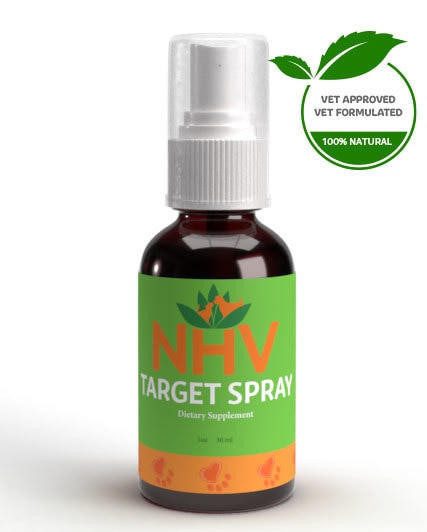
Holistic Tick & Flea Spray for Dogs
buy 2 and save $3
This flea spray for dogs soothes bites as well as protects against future ones. Give your pet the best with a holistic flea and tick spray for your dog from NHV’s line of natural pet products.
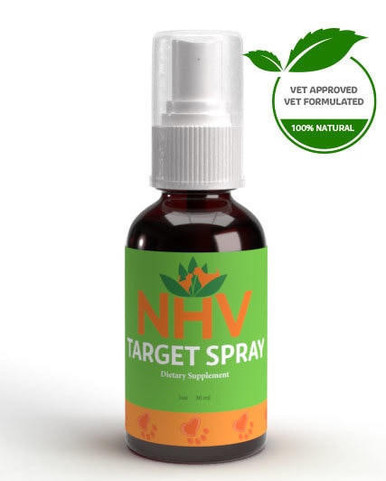
This flea spray for dogs soothes bites as well as protects against future ones. Give your pet the best with a holistic flea and tick spray for your dog from NHV’s line of natural pet products.
Pest infestations in your dog can result in a lot more than irritated, itchy skin. Serious concerns like Lyme disease, anemia, intestinal parasites, and hair loss are just a few of the side effects your dog may experience if bitten by insects. Skipping proactive care like our flea spray for dogs does more than risk your pet’s health and comfort: it also risks yours. Prioritize pest prevention in your household today with Target Spray for dogs.
Target Spray helps reduce the uncomfortable symptoms of a bug bite thanks to its naturally soothing antiseptic, anti-inflammatory, antioxidant, anti-fungal, and astringent properties. Target Spray also utilizes numerous herbs, essential oils, and other natural ingredients to deter pests and prevent future bites from occurring.
Give your pets the proactive care they need with NHV’s line of natural pet products. Avoid irritated skin, hair loss, and allergy flare-ups in your pet with flea and tick spray for dogs.
Aloe Vera — Soothes skin and promotes healing of bug bites
Benzoin Gum — Contains antiseptic, expectorant, and astringent qualities
Celandine — Helps against microorganisms and can help reduce swelling and pain
Ceylon Citronella Oil — Contains antiviral and antibacterial qualities and helps deter pests
European Pennyroyal — A natural insect deterrent and helps alleviate itching
Lavender — Contains antiseptic and anti-inflammatory healing qualities and is a natural insect deterrent
Lemongrass Oil — Contains antibacterial, anti-inflammatory, and anti-fungal qualities and also acts as a natural insect and mite deterrent
Milk Thistle — Used topically helps soothe inflamed skin
Neem — Contains insect deterrent qualities and provides wound healing support
Rosemary — Is a natural insect deterrent and contains antiseptic, astringent, and anti-inflammatory qualities
Sweet Scented Marigold — Deter pests and contains astringent, anti-inflammatory, and pain-relieving properties
Tea Tree Oil — Contains antiseptic qualities and can help against microorganisms
How to Administer
Topical Spray: Spray several times a day as need. It may some times be necessary to shave or trim your pet’s hair so that the Target spray reaches the affected area.
Caution
Do not spray near or into eyes or nose. Do not use in pregnant animals.
Pest infestations in your dog can result in a lot more than irritated, itchy skin. Serious concerns like Lyme disease, anemia, intestinal parasites, and hair loss are just a few of the side effects your dog may experience if bitten by insects. Skipping proactive care like our flea spray for dogs does more than risk your pet’s health and comfort: it also risks yours. Prioritize pest prevention in your household today with Target Spray for dogs.
Target Spray helps reduce the uncomfortable symptoms of a bug bite thanks to its naturally soothing antiseptic, anti-inflammatory, antioxidant, anti-fungal, and astringent properties. Target Spray also utilizes numerous herbs, essential oils, and other natural ingredients to deter pests and prevent future bites from occurring.
Give your pets the proactive care they need with NHV’s line of natural pet products. Avoid irritated skin, hair loss, and allergy flare-ups in your pet with flea and tick spray for dogs.
Aloe Vera — Soothes skin and promotes healing of bug bites
Benzoin Gum — Contains antiseptic, expectorant, and astringent qualities
Celandine — Helps against microorganisms and can help reduce swelling and pain
Ceylon Citronella Oil — Contains antiviral and antibacterial qualities and helps deter pests
European Pennyroyal — A natural insect deterrent and helps alleviate itching
Lavender — Contains antiseptic and anti-inflammatory healing qualities and is a natural insect deterrent
Lemongrass Oil — Contains antibacterial, anti-inflammatory, and anti-fungal qualities and also acts as a natural insect and mite deterrent
Milk Thistle — Used topically helps soothe inflamed skin
Neem — Contains insect deterrent qualities and provides wound healing support
Rosemary — Is a natural insect deterrent and contains antiseptic, astringent, and anti-inflammatory qualities
Sweet Scented Marigold — Deter pests and contains astringent, anti-inflammatory, and pain-relieving properties
Tea Tree Oil — Contains antiseptic qualities and can help against microorganisms
How to Administer
Topical Spray: Spray several times a day as need. It may some times be necessary to shave or trim your pet’s hair so that the Target spray reaches the affected area.
Caution
Do not spray near or into eyes or nose. Do not use in pregnant animals.
liver support
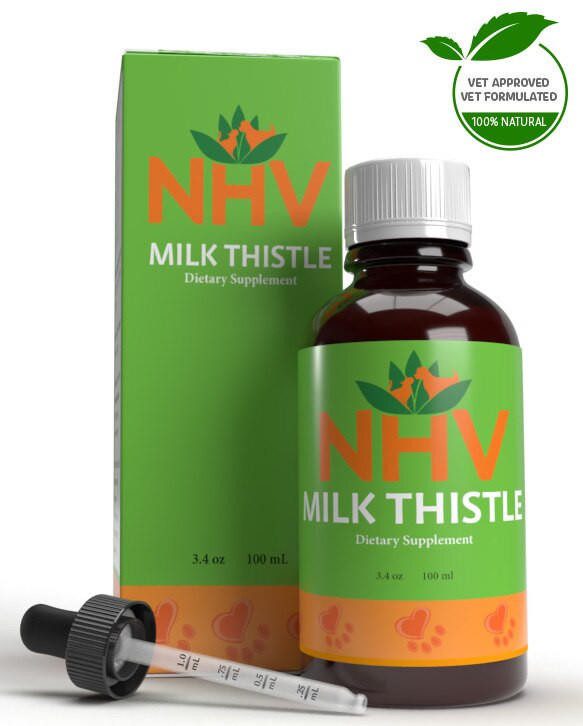
Support for liver and kidney detox and cancer support in dogs
3 month supply for a small to medium size pet
These effects help to remove chemicals and toxins that can accumulate in your dog’s system. It is one of the few herbs with no equivalent in conventional medicine.


These effects help to remove chemicals and toxins that can accumulate in your dog’s system. It is one of the few herbs with no equivalent in conventional medicine.

Milk Thistle is a powerful herb that’s been used by humans for thousands of years. The active ingredient, silymarin, has been shown through scientific studies to possess strong anti-inflammatory, antioxidant, and detoxifying properties. It also promotes cellular regeneration and repair.
This supplement by NHV Natural Pet Products uses 100% natural milk thistle to support dogs through liver and kidney conditions in addition to conventional treatment by their veterinarian.
Milk thistle improves kidney function due to the damage from:
The extraordinary antioxidant properties of milk thistle for dog extract acts to:
The scientific name for milk thistle is Silybum Marianum. It’s also referred to as wild artichoke and holy thistle.
Milk thistle for dog liver support can be used in conjunction with conventional treatments and is glycerin based and safe for long-term use. You can read more about the benefits of using milk thistle on Dr. Hillary Cook’s blog.
At NHV, all of our products including milk thistle for dog kidney support are plant-based and make excellent proactive support for many health conditions. If you have questions on milk thistle for dogs or any of our holistic supplements, you can ask an expert at NHV because we put your pet first when it comes to health and healing naturally.
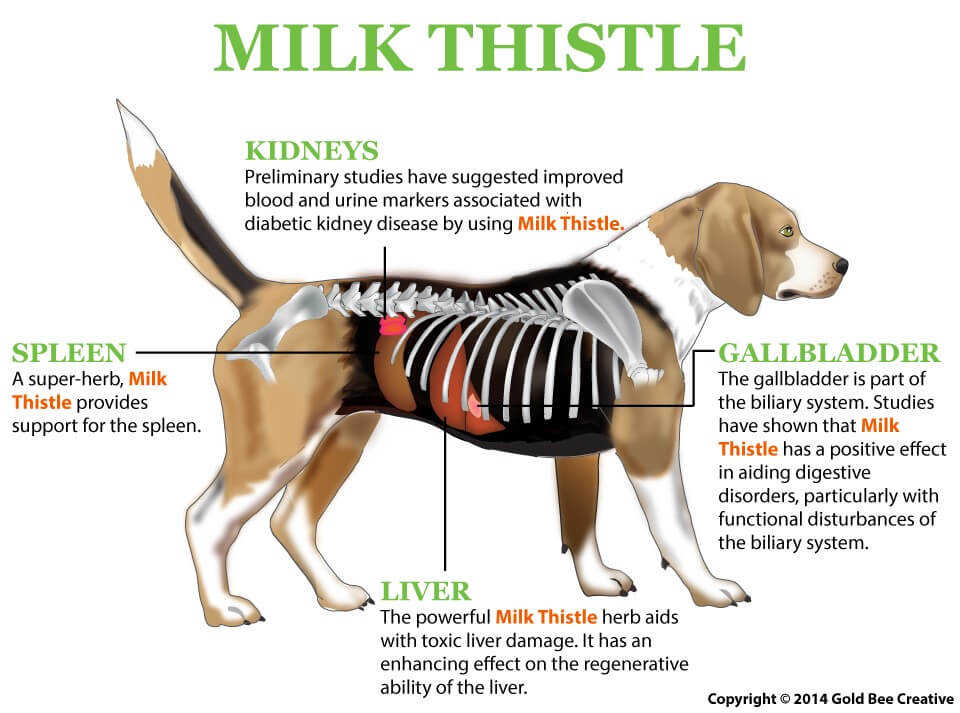
Select your pet's weight to determine the correct dose.
To be taken twice daily. Determine your pet’s weight and then use the easy chart below to determine the correct dose. This is the minimum dosage.
Pet's Weight Dosage
0 - 15 lb = 0.5 ml
16 - 30 lb = 1.0 ml
31 - 45 lb = 1.5 ml
46 - 60 lb = 2.0 ml
61 - 75 lb = 2.5 ml
Over 75 lb = 3.0 ml
How to Administer
Shake well before use. The easiest method is to use the dropper provide and places the drops into your pet’s food or favorite treat. You can also use the dropper and squirt directly into the pet’s mouth.
Some pets can be finicky, if this occurs consider hiding the drops in foods most pet’s love such as fish, chicken or yogurt or a favourite treat. If your pet only eats dry food then soak a few kibbles at feeding time.
For Best Results
Herbal dietary supplements are beneficial to the health and wellbeing of your pet and are safe for long-term use. Every pet responds to natural herbal supplements differently, therefore it is important to be consistent and administer the product daily. Supplements generally take two to four weeks to take effect, however this will vary from one animal to the next.
Product Storage
All NHV Natural Pet Products are pure herbal extracts and contain no artificial additives, preservatives or coloring. Shelf life after opening is 6 months and must be refrigerated after opening.
Cautions and Contraindications
Do not use Milk Thistle in pregnant or nursing animals. Speak to your vet before using our products. A second visit is recommended if your pet’s condition does not improve, or deteriorates after continued use of the supplements.
All information provided by NHV Natural Pet Products is for educational purposes only.
Milk Thistle is a powerful herb that’s been used by humans for thousands of years. The active ingredient, silymarin, has been shown through scientific studies to possess strong anti-inflammatory, antioxidant, and detoxifying properties. It also promotes cellular regeneration and repair.
This supplement by NHV Natural Pet Products uses 100% natural milk thistle to support dogs through liver and kidney conditions in addition to conventional treatment by their veterinarian.
Milk thistle improves kidney function due to the damage from:
The extraordinary antioxidant properties of milk thistle for dog extract acts to:
The scientific name for milk thistle is Silybum Marianum. It’s also referred to as wild artichoke and holy thistle.
Milk thistle for dog liver support can be used in conjunction with conventional treatments and is glycerin based and safe for long-term use. You can read more about the benefits of using milk thistle on Dr. Hillary Cook’s blog.
At NHV, all of our products including milk thistle for dog kidney support are plant-based and make excellent proactive support for many health conditions. If you have questions on milk thistle for dogs or any of our holistic supplements, you can ask an expert at NHV because we put your pet first when it comes to health and healing naturally.

Select your pet's weight to determine the correct dose.
To be taken twice daily. Determine your pet’s weight and then use the easy chart below to determine the correct dose. This is the minimum dosage.
Pet's Weight Dosage
0 - 15 lb = 0.5 ml
16 - 30 lb = 1.0 ml
31 - 45 lb = 1.5 ml
46 - 60 lb = 2.0 ml
61 - 75 lb = 2.5 ml
Over 75 lb = 3.0 ml
How to Administer
Shake well before use. The easiest method is to use the dropper provide and places the drops into your pet’s food or favorite treat. You can also use the dropper and squirt directly into the pet’s mouth.
Some pets can be finicky, if this occurs consider hiding the drops in foods most pet’s love such as fish, chicken or yogurt or a favourite treat. If your pet only eats dry food then soak a few kibbles at feeding time.
For Best Results
Herbal dietary supplements are beneficial to the health and wellbeing of your pet and are safe for long-term use. Every pet responds to natural herbal supplements differently, therefore it is important to be consistent and administer the product daily. Supplements generally take two to four weeks to take effect, however this will vary from one animal to the next.
Product Storage
All NHV Natural Pet Products are pure herbal extracts and contain no artificial additives, preservatives or coloring. Shelf life after opening is 6 months and must be refrigerated after opening.
Cautions and Contraindications
Do not use Milk Thistle in pregnant or nursing animals. Speak to your vet before using our products. A second visit is recommended if your pet’s condition does not improve, or deteriorates after continued use of the supplements.
All information provided by NHV Natural Pet Products is for educational purposes only.
Published: April 15, 2016